The week ahead in Parliament
- Published
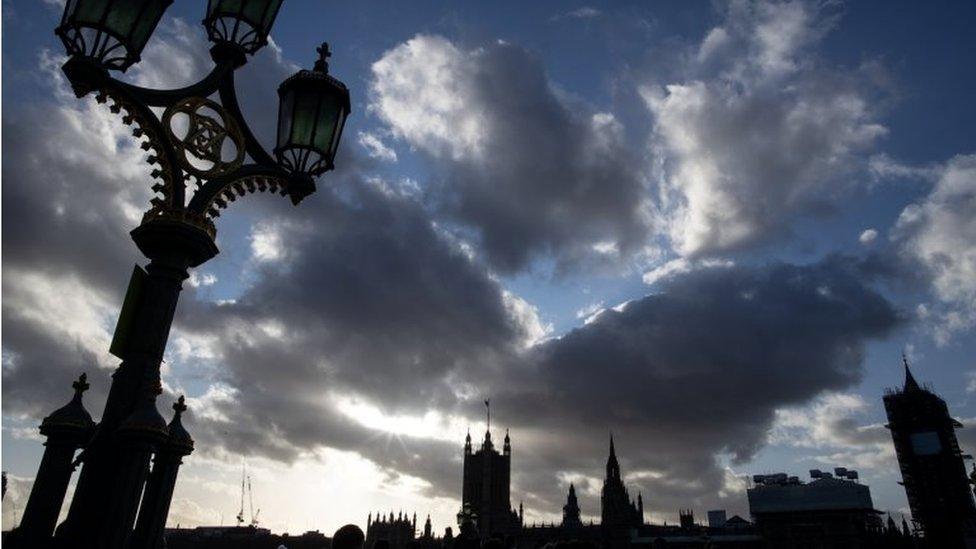
There's some significant law-making in the week ahead in Westminster, but with a government reshuffle in the air, Parliament will fizz with that special energy that comes when some careers are about to take off, and others are about to be shot down.
The reshuffle is expected on Thursday, too late to have much substantive effect on who's doing what in the Commons and Lords chambers.
But it will be interesting to watch the demeanour of ministers expecting to rise or fall.
The buzz is that the prime minister plans to put in place a cabinet and ministerial team for the next five years; this could involve terminating a number of careers, and a series of spectacular promotions for up and coming MPs.
That may, in turn, mean some new faces popping up at question times and debates, after the recess. And maybe even a few of the displaced or demoted taking a swipe at the PM.
The Leader of the House, Jacob Rees Mogg has already signalled that there could be some re-jigging of the agenda, to provide time to pass the promised emergency legislation to prevent the early release of prisoners convicted of terrorist offences, in the wake of the Streatham attack.
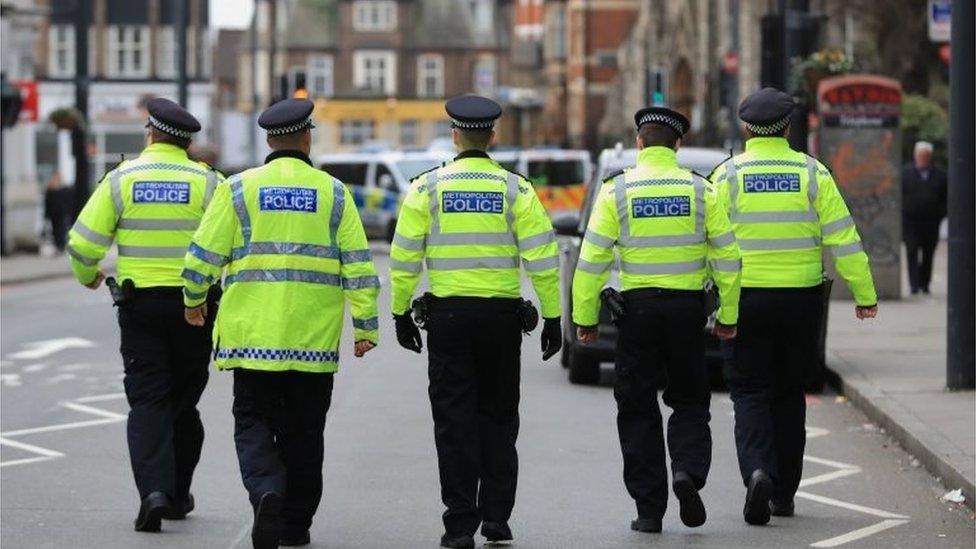
The perpetrator of the terror attack in Streatham, south London had been released from jail just 10 days before the incident
This could push back other legislation, and one possible candidate, on Tuesday, could be the bill to withhold parole from prisoners who have not revealed where they have buried the body of a murder victim or the identity of children pictured in indecent photographs.
Look out, too, for a statement on the outcome of the review into the High Speed railway (HS2) - which will link London, Birmingham, Manchester and Leeds.
The review has been carried out by former HS2 chairman Douglas Oakervee for the Government and has looked into the feasibility of the project despite massive overspend.
There is talk of an announcement this week, and given the lively heckling between supporters and opponents in the Commons, when the subject came up at PMQs, the result could be a lively couple of hours.
Here's my rundown of the week ahead:
Monday 10 February
The Commons week opens (14:30) with an hour of Home Office Questions, after which the usual collection of post weekend ministerial statements and urgent questions will probably follow,
The main legislating is the Second Reading debate on the Windrush Compensation Scheme (Expenditure) Bill, a two clause bill that gives the Home Office financial authority to make payments under the compensation scheme for people who did not have the right documentation to demonstrate their status in the UK and suffered adverse effects as a result.
MPs will then consider the orders for Social Security Benefits Up-Rating Order 2020 and the Guaranteed Minimum Pensions Increase - this includes a 3.9 per cent increase in the basic State Pension from £129.20 a week to £134.25 a week, from April 2020.
On the committee corridor (16:30) the First Delegated Legislation Committee considers an order under section 10 of the Anti-Terrorism, Crime and Security Act 2001, banning UK nationals and anyone living in the UK from making funds available to or for the benefit of Andrey Lugovoy, a deputy of the Russian parliament, and a former KGB bodyguard, and Dmitri Kovtun a Russian businessman and ex-KGB agent.
Both are wanted in connection with the death of Alexander Litvinenko.
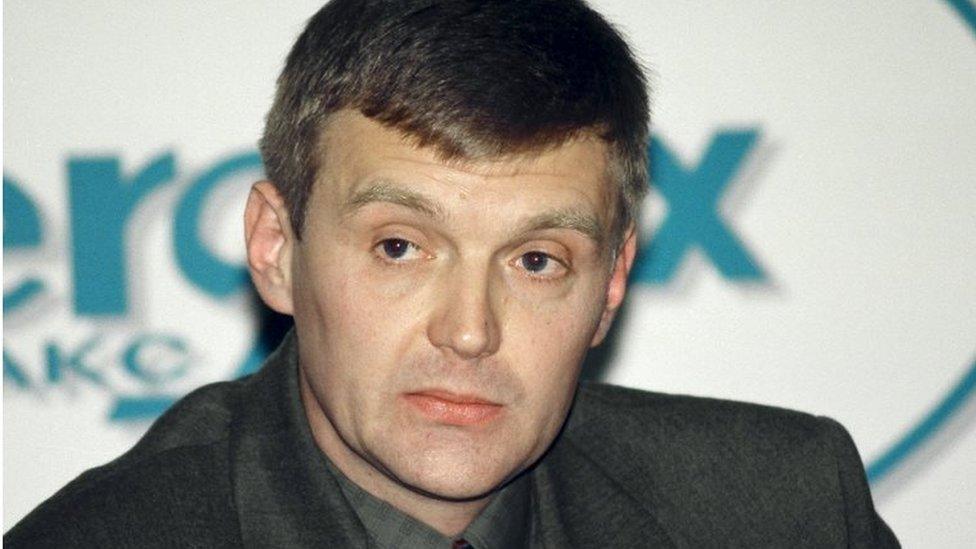
An inquiry found that the murder of ex-Russian spy Alexander Litvinenko was "probably" approved by President Vladimir Putin
In the Lords (14:30) ministers face questions on smart meters, devolution to Yorkshire, government policy towards Taiwan, and on the Air Accident Investigation Branch decision to retrieve the body of Emiliano Sala and not retrieve the body of David Ibbetson following the 2019 plane crash over the English Channel
Next comes the first of three days of Committee Stage debate on the Air Traffic Management and Unmanned Aircraft Bill.
Expect some probing to ensure the bill reflects the lessons of the 2018 incident at Gatwick, and creates a system which will allow the review of the legislative framework around drones.
Finally, there's a short debate on mandating training on learning disability and autism for all health and social care staff in England led by Baroness Hollins.
Tuesday 11 February
MPs kick off (11:30) with Treasury Questions, where I'm sure the spate of recent stories about tensions between the Chancellor and Downing Street will come up.
That is followed by the Second Reading of the Prisoners (Disclosure of Information About Victims) Bill.
This will require the Parole Board to take into account any failure by a prisoner serving a sentence for unlawful killing or for taking or making an indecent image of a child, to disclose information about the victim. This is also known as "Helen's Law" after Helen McCourt, whose killer refuses to reveal the location of her remains.
Then comes an SNP Opposition Day Debate on migration.
This picks up an issue raised by the SNP's Westminster Leader, Ian Blackford, at PMQs, about the Scottish government proposal for a Scottish visa within the UK immigration system.
Essentially they want powers over immigration to be devolved to Holyrood, in order to tailor the system to meet Scottish circumstances.
In Westminster Hall the subjects for debate include waste incineration facilities (09:30); the Consumer Rights Act 2015 and the Consumer Ombudsman Scheme (11:00): the effectiveness of the apprenticeship levy(14:30); the proposal for the Hinckley national rail freight interchange in South Leicestershire (16:00) and the protection of retail workers (16:30).
In the Lords (14:30) question time ranges across the government's plan to build 300,000 new homes a year for the next five years, increasing the number of social homes for rent, and bringing empty Victorian mills in the Pennines back into use.
The main debate is on the Second Reading of the Fisheries Bill - another major Brexit bill.
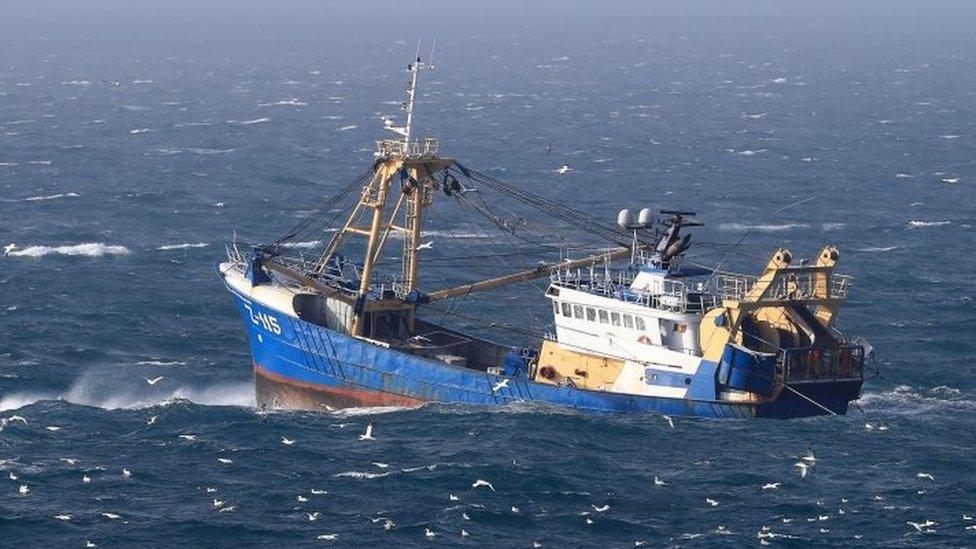
Fishing is likely to be a key area of contention in post-Brexit trade talks between the EU and UK
This one removes the right of EU vessels to fish in UK waters, gives UK vessels the right to fish anywhere in UK waters (at the moment the system is more localised) and introduces a series of environmental protections.
The key issues include strengthening sustainability and climate issues; reporting and policy making arrangements; fishing quotas; safety and employment standards; responsibilities to the UK devolved nations.
Again, there will be considerable probing of issues like enforcement of Maximum Sustainable Yield quotas and the nurturing of a healthy marine environment.
Watch out for Labour calls for a redistribution of fishing quotas away from the wealthy families who dominate ownership, towards smaller boats and fleets that use low impact gear.
And there will be calls for more use of drones and other surveillance technology to ensure deliberate overfishing is punished.
There's a Second Reading debate on the Sentencing (Pre-consolidation Amendments) Bill).
This is a technical measure to tweak existing legislation and remove historic and redundant layers of sentencing procedure so as to bring the Law Commission's Sentencing Code into operation.
The bill will be dealt with via the streamlined procedures for technical tidying-up proposed by Law Commission.
Meanwhile in the Moses Room (the Lords equivalent of Westminster Hall, peers will consider the Lugovoy and Kovtun Freezing Order (see Commons Monday).
Wednesday 12 February
The Commons day opens (11:30) with half an hour of Scotland questions, followed, at noon by Prime Minister's Question Time.
Then comes the annual whinge-athon on local council and police spending in England and Wales, as MPs are asked to approve the Police Grant Report and Local Government Finance Reports for 2020-21.
The government will point to the first real-terms increase in council spending for a decade - but the key issue will be the formula by which the money is distributed.
In Westminster Hall debates include Cornwall Conservative Sheryll Murray on the future of UK fisheries - a key Brexit issue, and particularly important as the Fisheries Bill debuts in the Lords (09:30) .
At 11:00 "Red Wall" Tory Ben Bradley will hold a debate on education and attainment for white working-class boys
In the afternoon, Labour's Hilary Benn leads a debate on leaseholders and cladding (14:30). This deals with the aftershocks of the Grenfell disaster.
While there is now a system in place to deal with the particular type of cladding found on Grenfell Tower, the fire services have now identified other forms of cladding they believe are dangerous.
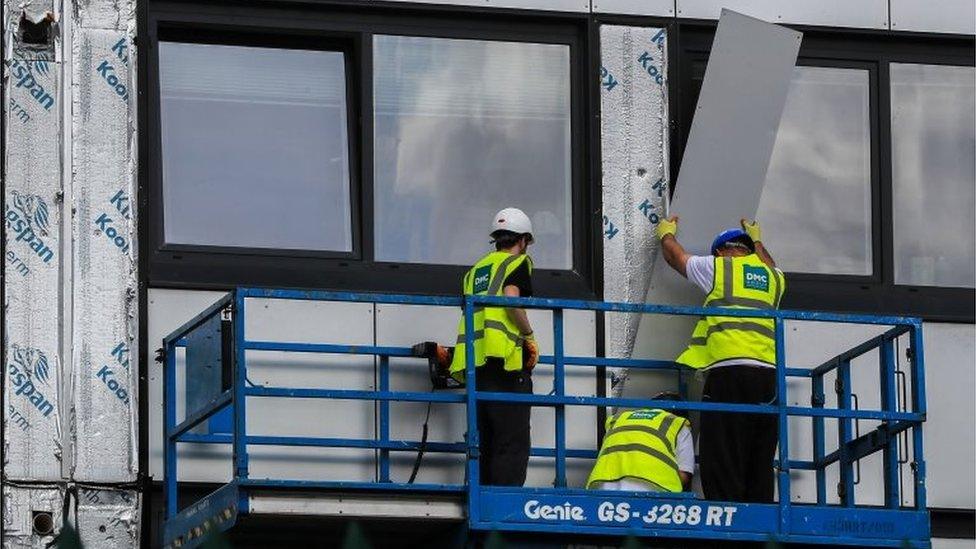
The second phase of the Grenfell Tower inquiry is looking at how the building came to be covered in flammable cladding during its refurbishment
This has led to leaseholders facing bills for a 24 hour fire watch being kept in their buildings and the prospect of still greater bills to remove the cladding.
The government has made clear that such bills should be met by freeholders, not leaseholders, where the exact type of cladding implicated in the Grenfell disaster is found; Mr Benn wants the same principle applied to other forms of cladding.
Former Lib Dem Leader Tim Farron leads a debate (16:00) on support for hill farmers, and the Conservative Sir David Evennett raises the subject of social mobility (16:30).
In the Lords (15:00) ministers field questions on reducing the disability gap and reviewing the rules for referendums, before continuing their Committee Stage debate on the detail of the Air Traffic Management and Unmanned Aircraft Bill.
There's also a short debate on the implications of decision-making and prediction by algorithm in the public sector, led by the Lib Dem, Lord Clement-Jones, who chaired a select committee inquiry into the implications of artificial intelligence in the last parliament.
Thursday 13 February
There's a slight juddering in the Commons question time schedule today, to take account of the abolition of the Brexit Department - so the Commons day now opens (09:30) with Culture Media and Sport questions.
It is just conceivable that a freshly-reshuffled replacement for stop-gap Culture Secretary, Nicky Morgan, might appear at the Dispatch Box, for an early debut, but it is more likely that the junior ministers will bat for their department.
At Business Questions, the Leader of the House of Commons, Jacob Rees Mogg, will set out the Commons agenda for the week after their half-term recess, and that will be followed by the traditional pre-recess debate, in which MPs can raise any issue they choose.
The result is normally pretty shapeless, with speeches about personal hobby horses and constituency campaigns jumbled together - the Backbench Business Committee once tried to bring some kind of order to the proceedings by setting aside times for MPs to raise issues under particular themes, but it didn't really work out, and they've now reverted to cheerful anarchy.
In the Lords (11:00) questions include the Conservative, Lord Sheikh, asking about the adoption of a formal definition of Islamophobia, and Lord Greaves on boosting the economies of former industrial and mining towns and villages in the North of England.
The main debates are on issues raised by Crossbench peers - starting with the threats posed by pests and diseases to native tree species, and a topical short debate on the safety of smart motorways.
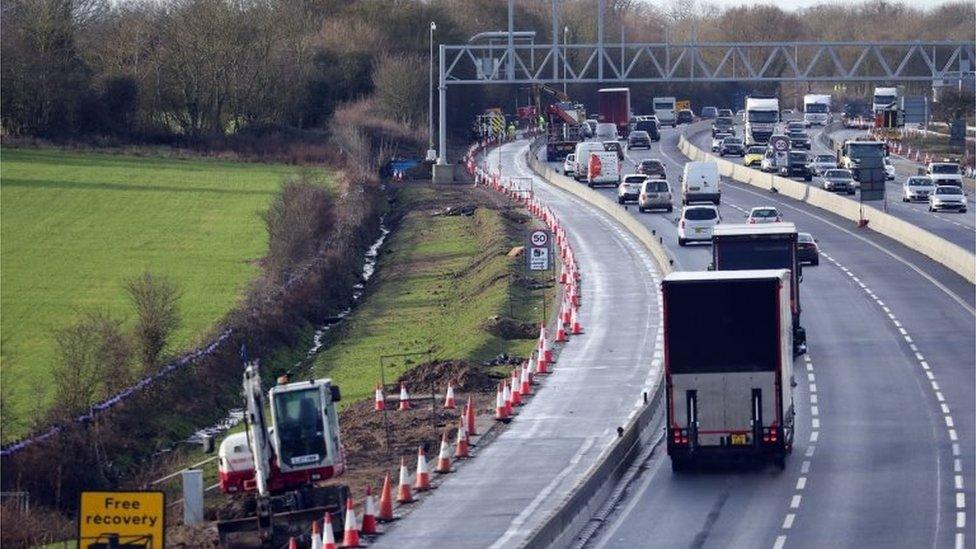
Smart motorways have been criticised because they do not have a hard shoulder and drivers who break down can be trapped in the speeding traffic
Finally, peers debate the All-Party Parliamentary Group for Adoption and Permanence's report 'Investing in families: the Adoption Support Fund beyond 2020.
The focus of the debate will be the Adoption Support Fund, introduced in May 2015 to provide funding to adopted children and their families to pay for therapeutic post-adoption support, which the government believes has had a positive impact.
The report recommends speeding up the pay-outs from the fund and allowing voluntary groups to apply directly for money from it.
Neither House sits on Friday 14 February - and Parliament takes its half term recess, reconvening on Monday 24 February.
- Published6 February 2020

- Published27 January 2020
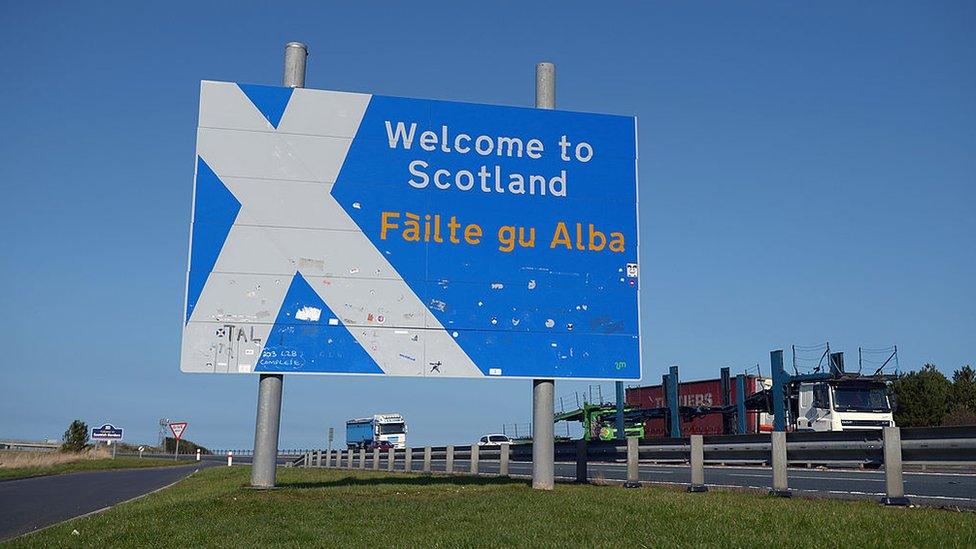
- Published29 January 2020

